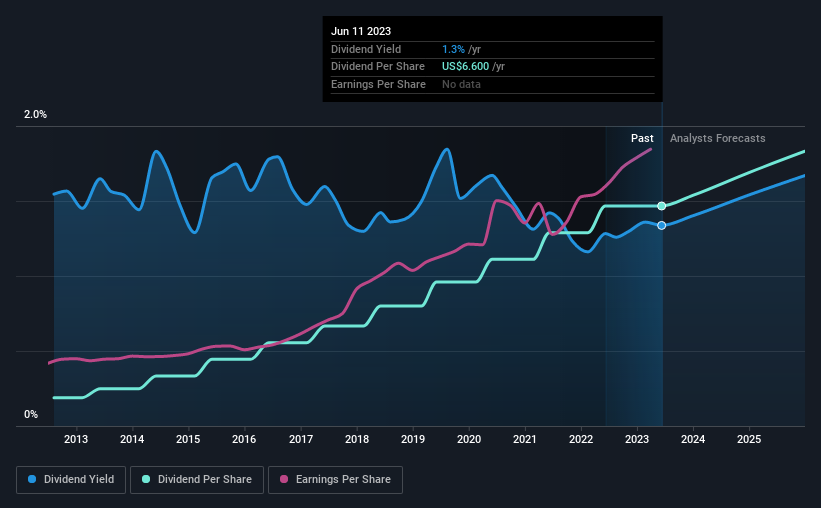Here's What We Like About UnitedHealth Group's (NYSE:UNH) Upcoming Dividend
Regular readers will know that we love our dividends at Simply Wall St, which is why it's exciting to see UnitedHealth Group Incorporated (NYSE:UNH) is about to trade ex-dividend in the next 3 days. Typically, the ex-dividend date is one business day before the record date which is the date on which a company determines the shareholders eligible to receive a dividend. The ex-dividend date is important as the process of settlement involves two full business days. So if you miss that date, you would not show up on the company's books on the record date. Accordingly, UnitedHealth Group investors that purchase the stock on or after the 15th of June will not receive the dividend, which will be paid on the 27th of June.
The company's next dividend payment will be US$1.88 per share, on the back of last year when the company paid a total of US$6.60 to shareholders. Based on the last year's worth of payments, UnitedHealth Group stock has a trailing yield of around 1.3% on the current share price of $493.62. We love seeing companies pay a dividend, but it's also important to be sure that laying the golden eggs isn't going to kill our golden goose! So we need to investigate whether UnitedHealth Group can afford its dividend, and if the dividend could grow.
See our latest analysis for UnitedHealth Group
Dividends are usually paid out of company profits, so if a company pays out more than it earned then its dividend is usually at greater risk of being cut. Fortunately UnitedHealth Group's payout ratio is modest, at just 30% of profit. Yet cash flow is typically more important than profit for assessing dividend sustainability, so we should always check if the company generated enough cash to afford its dividend. The good news is it paid out just 18% of its free cash flow in the last year.
It's positive to see that UnitedHealth Group's dividend is covered by both profits and cash flow, since this is generally a sign that the dividend is sustainable, and a lower payout ratio usually suggests a greater margin of safety before the dividend gets cut.
Click here to see the company's payout ratio, plus analyst estimates of its future dividends.
Have Earnings And Dividends Been Growing?
Businesses with strong growth prospects usually make the best dividend payers, because it's easier to grow dividends when earnings per share are improving. If earnings fall far enough, the company could be forced to cut its dividend. Fortunately for readers, UnitedHealth Group's earnings per share have been growing at 15% a year for the past five years. Earnings per share have been growing rapidly and the company is retaining a majority of its earnings within the business. Fast-growing businesses that are reinvesting heavily are enticing from a dividend perspective, especially since they can often increase the payout ratio later.
The main way most investors will assess a company's dividend prospects is by checking the historical rate of dividend growth. UnitedHealth Group has delivered 23% dividend growth per year on average over the past 10 years. Both per-share earnings and dividends have both been growing rapidly in recent times, which is great to see.
The Bottom Line
Should investors buy UnitedHealth Group for the upcoming dividend? UnitedHealth Group has been growing earnings at a rapid rate, and has a conservatively low payout ratio, implying that it is reinvesting heavily in its business; a sterling combination. Overall we think this is an attractive combination and worthy of further research.
While it's tempting to invest in UnitedHealth Group for the dividends alone, you should always be mindful of the risks involved. For example, we've found 1 warning sign for UnitedHealth Group that we recommend you consider before investing in the business.
If you're in the market for strong dividend payers, we recommend checking our selection of top dividend stocks.
Have feedback on this article? Concerned about the content? Get in touch with us directly. Alternatively, email editorial-team (at) simplywallst.com.
This article by Simply Wall St is general in nature. We provide commentary based on historical data and analyst forecasts only using an unbiased methodology and our articles are not intended to be financial advice. It does not constitute a recommendation to buy or sell any stock, and does not take account of your objectives, or your financial situation. We aim to bring you long-term focused analysis driven by fundamental data. Note that our analysis may not factor in the latest price-sensitive company announcements or qualitative material. Simply Wall St has no position in any stocks mentioned.
Join A Paid User Research Session
You’ll receive a US$30 Amazon Gift card for 1 hour of your time while helping us build better investing tools for the individual investors like yourself. Sign up here



